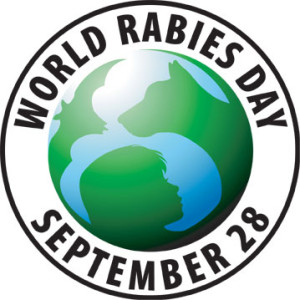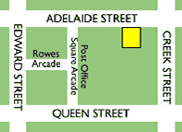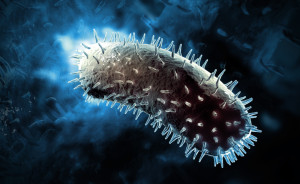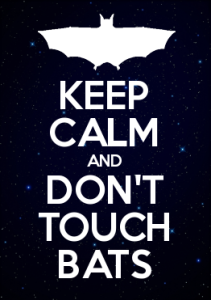World Rabies Day 2013
September 27th, 2013QLD media release and media outcomes

FOR WORLD RABIES DAY
SAT, SEPTEMBER 28, 2013
‘Look, but don’t touch’ urges Queensland rabies expert
A leading travel-health pioneer will issue Queenslanders with a public health warning today (Saturday, September 28) about the risks associated with a disease that kills an estimated 55,000 people each year.1
Dr Deborah Mills, known as ‘Dr Deb’ by her patients, is a highly respected authority on the prevention and treatment of rabies and the closely related lyssavirus. This virus, first discovered in 19962 in Australian flying foxes (commonly known as ‘fruit bats’), is responsible for three Australian deaths, all in Queensland, the most recent occurring in February 2013. 3
Although Australia’s rabies-free status has not changed due to the Australian Bat Lyssavirus discovery, Dr Deb warns Queenslanders not to be complacent.
“The lyssavirus poses only a low public health risk to Queenslanders, as long as they take the necessary precautions.
“Australian residents do not need rabies vaccines unless they are travelling overseas or are bitten or scratched by a flying fox. Every Australian does however need to be aware,” Dr Deb said.
“We teach our kids about snakes and blue-ringed octopi. Everyone knows that you don’t touch them, but people don’t realise it’s the same with flying foxes.”
“Australian flying foxes are an essential part of the ecosystem. Unlike snakes, flying foxes almost never approach humans,” said Dr Deb.
“Flying foxes may become a risk to humans if they get tangled in nets or barbed wire, because people often want to help rescue them,” Dr Deb said.
“This is not a good idea. It’s okay to look, but don’t touch!” Dr Deb said.
“Only a very small proportion of flying foxes carry lyssavirus. However, unless you know what you are doing, and are vaccinated against rabies, it’s like playing Russian roulette if you handle these animals.”
Dr Deb encourages those who encounter a flying fox in need of rescue to call the 24-hour Bat Rescue Hotline at 0488 228 134.
Any Queenslander who is bitten or scratched by a flying fox should immediately wash the affected area with soap and water and contact their local doctor to be vaccinated. The rabies vaccine is protective against Australian Bat Lyssavirus.
“The tragic death of a Queensland boy due to lyssavirus earlier this year serves as a timely reminder to all parents to talk to their children about rabies and the importance of informing someone if they are bitten or scratched by any animal, particularly a bat or flying fox,” said Dr Deb.
About Australian Bat Lyssavirus
Australian Bat Lyssavirus is present among all four types of flying foxes, with a subtype also found in insectivorous bats that are prevalent across mainland Australia, and is closely related to the classical rabies virus. Both are members of the same genus of viruses, the Genus Lyssavirus (Family Rhabdovirudae).4
About rabies
Rabies, a zoonotic disease, is a potentially fatal virus transmitted to people through scratches, bites or close contact with saliva from infected animals on broken skin.5,6 Prevalent throughout much of Africa, Asia, the Americas and Europe, Australian travellers are constantly visiting high-risk destinations for rabies.5 For Australians travelling abroad, dog bites in the developing world represent the main risk,3 but handling flying foxes is the primary risk for contracting rabies in Australia.
About World Rabies Day
World Rabies Day aims to raise awareness about the impact of human and animal rabies, how easy it is to prevent, and how to eliminate the main global sources. Created by the Global Alliance for Rabies Control (GARC), World Rabies Day involves every major human and animal health partner at an international, national, State/provincial and local level, as well as veterinary, medical and other specialised professional and student organisations, corporate and non-profit partners.
World Rabies Day is designed to mobilise awareness and resources in support of human rabies prevention and animal rabies control. With the initial goal of engaging 55,000 people to take action – one for each person who dies each year from rabies – the inaugural campaign, coordinated in September 2007, involved almost 400,000 people from 74 countries. Since its launch, World Rabies Day has educated more than 250 million people in 150 countries and has vaccinated over 8 million animals. More info
About Lincoln Lyssavirus case
Lincoln Lyssavirus case
More info about Lincoln Lyssavirus foundation
About Dr Deb
Dr Deborah Mills is one of the country’s leading travel healthcare professionals, having worked in this highly specialised field for 20 years. She has become fondly and widely known as ‘the Travel Doctor’ through her years of educating Australians about the importance of travel health.
Dr Deb is the author of Travelling Well, which is regarded as the healthcare bible for Australian travellers venturing overseas. She is also a strong and regular contributor to various local and international charities and regularly provides assistance to various medical and international organisations working to make the world a better place.
ends#
Some of the online media Publicity from this day
http://au.news.yahoo.com/a/19147627/bat-victims-dad-speaks-out-on-rabies-day/
http://www.illawarramercury.com.au/story/1826781/handling-flying-foxes-russian-roulette/?cs=2452
References
- World Health Organization (WHO). Rabies fact sheet; September 2011. WHO Available at http://www.who.int/mediacentre/factsheets/fs099/en/ [last accessed 25 September 2013].
- National Center for Emerging and Zoonotic Infectious Diseases (NCEZID), Division of High-Consequence Pathogens and Pathology (DHCPP), http://www.cdc.gov/features/rabies/.
- Gherardin, T. Australia is not rabies-free, Asian Biomedicine Vol. 1 No. 1 June 2007.
- P. Leggat and J. Goldsmid, Tropical Medicine for Health Professionals. The Australasian College of Tropical Medicine, Inc., 2001.Publisher: ACTM Publications.
- NHMRC. The Australian Immunisation Handbook, 9th Edition. 2008; Chapter 2. Vaccination for international travel. World Health Organization (WHO).
- Rabies fact sheet; September 2011. WHO Available at http://www.who.int/mediacentre/factsheets/fs099/en/ [last accessed 25 September 2013].





